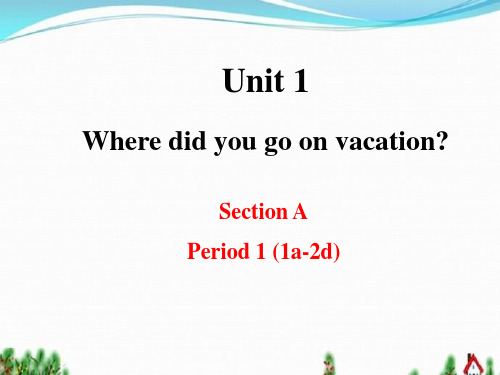英语人教版八年级上册微课课件
合集下载
最新人教版八年级英语上册全套精品课件(含音视频)

weren't at home. Where were you?
—Oh, I was _____ vacation.
A.by B.at C.for D.on
Presentation
1a Match the activities with the pictures [a-g].
Where did you go on vacation?
1b Listen and number the people in the
picture [1-5].
Where did you go
on vacation?
I went to the
2 . mountains
4
53
1. Tina 2. Xiang Hua
3. Sally
4. Bob
5. Tom
Where did you go on vacation? 你去哪里度假了?
其中did是助动词,没有人称和数的变化,谓语 动词是实义动词,且用原形。
Where did they go yesterday? What did you do last Sunday? go on vacation 在度假
I went to the mountains.
1
1. stayed at home __f___ 2. went to New York City ___b___ 3. visited my uncle __g__ 4. went to summer camp __d___ 5. went to the mountains __c___ 6. went to the beach __a____ 7. visited museums ___e___
—Oh, I was _____ vacation.
A.by B.at C.for D.on
Presentation
1a Match the activities with the pictures [a-g].
Where did you go on vacation?
1b Listen and number the people in the
picture [1-5].
Where did you go
on vacation?
I went to the
2 . mountains
4
53
1. Tina 2. Xiang Hua
3. Sally
4. Bob
5. Tom
Where did you go on vacation? 你去哪里度假了?
其中did是助动词,没有人称和数的变化,谓语 动词是实义动词,且用原形。
Where did they go yesterday? What did you do last Sunday? go on vacation 在度假
I went to the mountains.
1
1. stayed at home __f___ 2. went to New York City ___b___ 3. visited my uncle __g__ 4. went to summer camp __d___ 5. went to the mountains __c___ 6. went to the beach __a____ 7. visited museums ___e___
人教版八年级英语上册-全册PPT课件全集(149张)

26) more than 多于
课文要点
1、What do you usually do on weekends?
on weekens 表示“在周末”,泛指每个周末; on the weekend表示“在周末,在这个周 末”,特指某个周末。
2、help with housework
help sb. with sth. = help sb. (to) do sth
初二英语上册
Unit 1: Where did you go on vacation?
New Words.
anyone wonderful something seem someone try different umbrella hungry dislike anywhere most everyone bored dicide wonder wait enough
修饰不可数名词,意为 “太多”,还可修饰动词 做状语
修饰形容词或副词,意为 “太”
She bought too many eggs. We have too much work to do.
You are walking much too fast.
too much, much too,用法区别看后头,much后接不可数, too后修饰形或副。Too many 要记住,后面名词必复数。
1)单数名词词尾加’s, 复数名词词尾没有s, 也要加 ’s the girl’s pen Children’s Day
2)复数名词以s结尾的只加 ’ the students’ reading room
3)如果两个名词并列,并且分别有 ’s, 则表示“分别有”; 只 有一个名词有一个’s, 则表示“共有”;
八年级上册英语全册课件(人教版)

Claire: Twice a week, on Wednesday and Friday. Jack: Well, how about Tuesday? Claire: Oh, I have to play tennis with my friends.
But do you want to come? Jack: Sure.
Where did you go on vacation?
went to New York City
Where did you go on vacation?
went to the beach
Where did you go on vacation?
visited my uncle
Where did you go on vacation?
全北美京著新名A世的M纪C电电影影院院线 I often go to the movies.
I often play football.
What do you usually do on weekends? I often do some reading. I often watch TV.
What do you usually do on weekends?
2a Listen. Cheng Tao is talking about how often he does these activities. Number the activities you hear <1-5>.
3
5 4 2
2b Listen again. Match the activities in 2a with how often Cheng Tao does them.
英语人教版八年级上册微课课件

一般将来时
(Simple Future Tense)
(一)含义:
一般将来时表示将来某个时间要发生的动作或存在 的状态,也可表示将来经常或反复发生的动作。
2015
2017 2019
I’m thirteen years old now. And I will be fifteen years old in two years. 现在我十三岁,两年后我将是十五岁。
There be句型一般将来时
肯定句: There will be….
eg: There will be more trees in 50 years.
否定句:
There won’t be….
eg: There won’t be more trees in 50 years.
一般疑问句: Will there be..? eg: Will there be more trees in 50 years? 肯定回答:Yes, there will.
否定回答: No, there won’t.
(二)时间状语: tomorrow(明天), the day after tomorrow(后天),
next week(下周),
soon(很快),
in the future(将来), in +时间段(…之后)等。
(三)构成:
1.谓语:will + do(动词原形) eg: I will leave for Beijing next week.
2. will常’ll, she will=she’ll, they will=they’ll…
一般将来时(will)
肯定句
否定句
(四)句型结构 (visit)
(Simple Future Tense)
(一)含义:
一般将来时表示将来某个时间要发生的动作或存在 的状态,也可表示将来经常或反复发生的动作。
2015
2017 2019
I’m thirteen years old now. And I will be fifteen years old in two years. 现在我十三岁,两年后我将是十五岁。
There be句型一般将来时
肯定句: There will be….
eg: There will be more trees in 50 years.
否定句:
There won’t be….
eg: There won’t be more trees in 50 years.
一般疑问句: Will there be..? eg: Will there be more trees in 50 years? 肯定回答:Yes, there will.
否定回答: No, there won’t.
(二)时间状语: tomorrow(明天), the day after tomorrow(后天),
next week(下周),
soon(很快),
in the future(将来), in +时间段(…之后)等。
(三)构成:
1.谓语:will + do(动词原形) eg: I will leave for Beijing next week.
2. will常’ll, she will=she’ll, they will=they’ll…
一般将来时(will)
肯定句
否定句
(四)句型结构 (visit)
人教版八年级英语上册全部课件

10) up and down 上上下下 11) so … that… 如此…以至于
复合不定代词
不指名代替任何特定名词或形容词的 代词叫做不定代词。
复合不定代词是由some, any, no, ev ery加上one, body, thing等所组成的不 定代词。
nothing, nobody, no one, everything, everybody, e veryone, anyone, anybo dy, anything, someone, s omebody, something
too much, much too,用法区别看后头,much后接 不可数,too后修饰形或副。Too many 要记住,后面 名词必复数。
6、课本句型:And because of the bad weath er, we couldn’t see anything below. because of 后跟名词、代词、He lost his job be 动名词、或相当 cause of his age. 于名词的短语, 不能接句子。 连词,引导状语 I didn’t buy the s 从句,表示直接 hirt because it wa 明确的原因或理 s too expensive. 由
初二英语上册
Unit 1: Where did you go on vacation?
New Words.
anyone wonderful something seem someone try different umbrella hungry dislike an ywhere most everyone bored dicide wonder wait enough
1、指定对象;
人教版八年级英语上册 Unit1第四课时 教学课件PPT初二公开课

try to do sth. 尽力做某事 指努力去做某事。
try doing sth.
尝试做某事
含有看看某种方法是否能成 功的意思,不一定付出努力。
3. I felt like I was a bird.(教材P5 2b)
feel like 有 ······的感觉;感到 feel like 后常接名词或从句,意为“有 ······的感觉; 感到”。
In the afternoon, we rode bicycles to Georgetown. There are a lot of new buildings now, but many of the old buildings are still there. In Weld Quay, a really old place in Georgetown, we saw the houses of the Chinese traders from 1 0 0 years ago. I wonder what life was like here in the past. I really enjoyed walking around the town.
My sister and I tried paragliding. I felt like I was a bird.
It was so exciting ! For lunch, we had something very
special — Malaysian yellow noodles. They were delicious!
Read the second diary entry and answer the questions. 1 . How did they go to the top of Penang Hill? 2 . What was the weather like that day? 3 . What did they forget to bring? 4 . What did they eat on Tuesday? Why did they eat that?
人教版八年级英语上册全部PPT课件

为“太多”
many eggs.
修饰不可数名词,意为 We have too
too much “太多”,还可修饰动 much work to
词做状语
do.
修饰形容词或副词,意 You are
much too 为“太”
walking much
too fast.
too much, much too,用法区别看后头,much后接 不可数,too后修饰形或副。精选Tppot o many 要记住,后面 18 名词必复数。
body together dentist
however almost point least
hardly
23
精选ppt
New Words
once internet互联网;因特网
full maybe
coffee
percent百分之… although
mind such die
magazine than less
anything?
精选ppt
8
2、复合不定代词的数
1)复合不定代词都具有单数的含义,当它 们充当句子的主语时,其后面的位于动词用单 数形式;
For example: Is everyone here today?
2)当要对一群人讲话时,可使用以复合不 定代词做主语的祈使句,句中的动词用原形。
For example: Everyone lie down! 统统趴下!
12
3) Enough 的相关短语:
sure enough 果真;确实 well enough 还不错,还可以,相当好 be good/ kind enough to do sth 劳驾;务必 请做某事
人教版八年级英语上册全册课件

Kevin, where did you go on vacation?
Oh, that’s nice. Did you swim?
I_w___e__n__t__t_o__t__h__e__b__e__a_c_ h.
_Y__e__s_,__I__d__i_d__._____________ _T___h__e__w___a_t__e_r___w__a__s______ _r__e_a__l_l_y___w__a__r__m___.________
Unit7Section A Unit7 Section B Unit8 Section A Unit8 Section B Unit9 Section A Unit9 Section B
Unit10Section A
Unit10 Section B
1.1
Unit 1 Section A
Whion?
✔
✔
✔
No, I didn’t.
play volleyball?
✔
Kevin swim?
✔
meet anyone
interesting?
✔
do anything
Julie interesting?
✔
study for tests? ✔
go out with
anyone?
✔
Pair work-2c
Listening-1b
Listen and number the people in the pictures [1-5].
Where did you go on vacation? I went to the mountains.
2 1
4
5
Oh, that’s nice. Did you swim?
I_w___e__n__t__t_o__t__h__e__b__e__a_c_ h.
_Y__e__s_,__I__d__i_d__._____________ _T___h__e__w___a_t__e_r___w__a__s______ _r__e_a__l_l_y___w__a__r__m___.________
Unit7Section A Unit7 Section B Unit8 Section A Unit8 Section B Unit9 Section A Unit9 Section B
Unit10Section A
Unit10 Section B
1.1
Unit 1 Section A
Whion?
✔
✔
✔
No, I didn’t.
play volleyball?
✔
Kevin swim?
✔
meet anyone
interesting?
✔
do anything
Julie interesting?
✔
study for tests? ✔
go out with
anyone?
✔
Pair work-2c
Listening-1b
Listen and number the people in the pictures [1-5].
Where did you go on vacation? I went to the mountains.
2 1
4
5
- 1、下载文档前请自行甄别文档内容的完整性,平台不提供额外的编辑、内容补充、找答案等附加服务。
- 2、"仅部分预览"的文档,不可在线预览部分如存在完整性等问题,可反馈申请退款(可完整预览的文档不适用该条件!)。
- 3、如文档侵犯您的权益,请联系客服反馈,我们会尽快为您处理(人工客服工作时间:9:00-18:30)。
否定回答: No, there won’t.
一般将来时
(Simple Future Tense)
(一)含义:
一般将来时表示将来某个时间要发生的动作或存在 的状态,也可表示将来经常或反复发生的动作。
2015
2017 2019
I’m thirteen years old now. And I will be fifteen years old in two years. 现在我十三岁,两年后我将是十五岁。
2. will常缩写为’ll,与主语连写在一起,如:
I will=I’ll, she will=she’ll, they will=they’ll…
一般将来时(will)
肯定句
否定句
(四)句型结构 (visit)
主语 + will do… I will visit Tom tomorrow.
主语+ won’t(will not )do… I won’t visit Tom tomorrow. (will后+not) 一般疑问句 Yes, 主 will. Will+ 主语 +do…? (will提前) No, 主 won’t. Will you visit Tom tomorrow ? 特殊疑问句 特殊疑问词 +will +主语+do…? Who will you visit tomorrow?
There be句型一般将来时
肯定句: There will be….
eg: There will be more trees in 50 years.
否定句:
There won’t be….
eg: There won’t be more trees in 50 years.
一般疑问句: Will there be..? eg: Will there be more trees in 50 years? 肯定回答:Yes, there will.
(二)时间状语: tomorrow(明天), the day after tomorrow(后天ຫໍສະໝຸດ ,next week(下周),
soon(很快),
in the future(将来), in +时间段(…之后)等。
(三)构成:
1.谓语:will + do(动词原形) eg: I will leave for Beijing next week.
